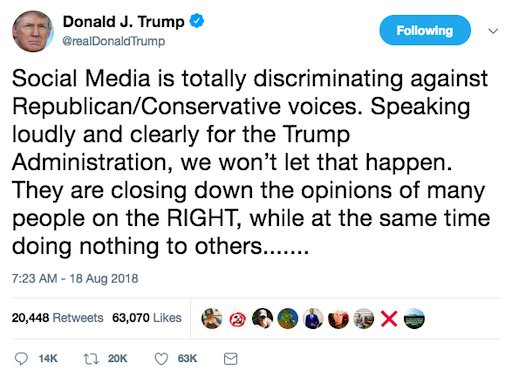#SlipperySlope: How the Fifth Circuit’s Decision in NetChoice v. Paxton Potentially Harms the Public Through Social Media Deregulation
Photo from X / Twitter
Thinking back upon the Trump presidency, most people around the world likely remember how the President’s Twitter account advertised his thoughts varying from foreign affairs to consuming a Big Mac on Air Force One. Arguably, Oval Office decisions have never seemed so accessible to the public. However, after the deadly insurrection at the US Capitol, Twitter permanently suspended then-President Trump’s account @realDonaldTrump. The social media platform cited a risk of further incitement of violence as the main reason behind the suspension. In addition to providing a justification for the permanent suspension, Twitter provided a detailed explanation of their assessment.
Managing online content that may catalyze dangerous situations in reality seems socially responsible as the duty of the social media platform provider. Despite the apparent necessity of social media moderation to combat misinformation and real world harm, the Fifth Circuit’s recent decision in NetChoice v. Paxton upholds Texas state legislation intending to deregulate user content. In September 2021, the Texas House successfully voted to pass House Bill 20. Regulating social media platforms with over 50 million users, House Bill 20 dictates that these social media platforms cannot censure content based on “viewpoint.” Some examples of social media platforms subject to the legislation include Facebook, TikTok, and Twitter. Additionally, House Bill 20 requires social media platforms to regularly generate reports of removed content, create easily-accessible complaint systems, and disclose content regulation policies and procedures. Reasoning that widely-used platforms control narratives surrounding various issues in the United States, the Texas state legislature desired to subjugate these online platforms in order to encourage minority views. Governor Greg Abbott supported such legislation as he believes that social media platforms actively silence “conservative ideas and religious beliefs.”
On the contrary, critics of House Bill 20 argue that its passage leads to serious First Amendment issues concerning government regulation of companies’ speech. Allowing House Bill 20 to go into effect could lead to government intervention in what companies permit their customers to say or do. This type of intrusive regulation seems contrary to the spirit of the First Amendment.
Despite the potential First Amendment concerns, the Fifth Circuit ruled in favor of Texas by reversing the district court’s preliminary injunction to prevent the law from going into effect. The district court reasoned that social media platforms are not “common carriers” and are allowed an amount of “editorial discretion” afforded to media such as newspapers. Further, the district court stated that Texas House Bill 20’s disclosure requirements appeared “burdensome” to the social media platforms due to the “unfathomably large” number of posts. However, the Fifth Circuit, regarding the district court’s reasoning, stated that the district court did not offer a full explanation for their “facial attack” on the bill.
Subsequently, the Fifth Circuit evaluated the district court’s grant of a preliminary injunction for abuse of discretion. Using the First Amendment overbreadth doctrine, the Fifth Circuit disagreed with the district court that Texas House Bill 20 chills speech. Rather, the Fifth Circuit asserted that Texas House Bill 20 protects consumers’ speech by preventing unnecessary censorship. Since Texas House Bill 20 chills censorship as opposed to speech, the Fifth Circuit determined that the First Amendment overbreadth doctrine — as a judicial standard of review — does not apply to Texas House Bill 20. The Fifth Circuit also reasons that platform censorship does not equate to editorial discretion as NetChoice fails to define what they consider editorial discretion.
The Fifth Circuit sided with Texas in determining that social media platforms are common carriers subject to nondiscrimination regulation. In the eyes of the Fifth Circuit, social media platforms are obviously members of the communications industry. Since social media platforms facilitate users’ communication with other users and do not engage in individualized bargaining but rather serve the public, there is a need to serve the public interest. The Fifth Circuit concluded that Texas House Bill 20 is permissible as it protects individual speech rights on social media platforms by chilling censorship of posts based upon arbitrary sentiment of the platform providers. Since Texas House Bill 20 provides exemptions for censorship when posts involve explicit content or cyber-criminal activity, the Fifth Circuit found that the bill does not jeopardize the public as content is not supposed to be regulated purely on viewpoint.
Although the Fifth Circuit believes that Texas House Bill 20 chills censorship as opposed to speech, their reasoning allows for a legislative gray area that might promote harmful online activity. While individuals possess First Amendment rights that protect the freedom of speech, the arbitrariness of the term “viewpoint” in Texas House Bill 20 creates the opportunity for people to defend dangerous misinformation or potentially harmful behavior by arguing that this constitutes their opinion on a matter. For example, the posting of President Trump’s tweets leading up to the January 6th US Capitol attack would still be permissible on Twitter under Texas House Bill 20. President Trump could argue that his tweets reflected his viewpoint that the 2020 presidential election was stolen from him. Censoring those tweets constitutes stifling his viewpoint that he desires to share with others. Knowing that words carry significant meaning, especially after the Jan. 6th attack, it seems essential that social media platforms regulate potentially harmful content no matter whose viewpoint is involved. Thus, the district court, on further review, should reach the same conclusion.
Alexandra Herrera is a senior at Brown University, concentrating in Sociology with a focus in law and public policy. She is a staff writer for the Brown University Undergraduate Law Review and can be contacted at alexandra_herrera@brown.edu.
